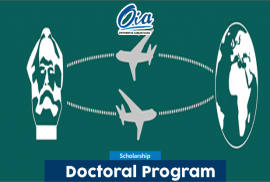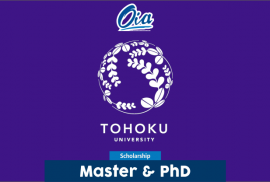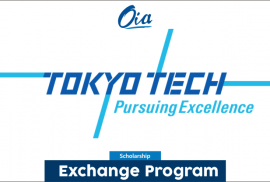[Scholarship is offered for this program]
Kyushu University was founded in 1911 and has grown to be one of the most prestigious universities in Japan. At present, there are 11 undergraduate schools, 18 graduate schools, 3 research institutes, and a hospital. Approximately 19,000 students and 2,200 faculty members are engaged in study and/or research at the University. Kyushu University is located in Fukuoka, gateway of Kyushu. Geographically and historically, the city is close to other parts of Asia, so we have been aiming to be the “University opened to Asia” from the beginning. Also, a new main campus, in Ito opened in 2005, where some departments have begun its activities.
Program brochure: 【Kyushu University】
Scholarship
[Scholarship is offered for this program]
“Ernst Mach Grant – ASEA-UNINET” financed by the Austrian Federal Ministry of Science, Research and Economy (BMWFW).
Please be informed that the online application for the Ernst Mach-Grants 2018 is NOW open!
The closing date for application is March 31st 2018!
On behalf of the Austrian National Division of the ASEAN- University Network, I kindly ask you to please distribute this information as widely as possible and especially among all potential candidates in your institution and beyond. Please also note that this grant is not limited to ASEA-UNINET member universities and thus students from all universities in Indonesia, Thailand and Vietnam are welcome to apply for the grant!
Under this grant we offer four different types of scholarships:
à Post-doc Grants (research grants)
Duration: 3 – 9 months
Grant benefit: 1,150 euros
à PhD-Grants
Grant for a complete PhD programme in Austria
Duration: 36 months
Grant benefit: 1,050 euros
à Sandwich-Grants
Grant for a partial study period during a PhD programme in Austria
Duration: 9 months
Grant benefit: 1,050 euros
à Music-Grants
Duration: max. 9 months
Grant benefit: 1,050 euros
Additionally, scholarship holders receive a travel cost subsidy of max. 730 euros.
è Applications are open to postgraduates who have obtained a master degree (including master thesis) or a doctoral degree (or equivalent degree) in various fields (including e.g. Natural Sciences, Technical Sciences, Human Medicine, Health Sciences, Agricultural Sciences, Social Sciences, Humanities Arts) as well as to graduates in the field of music.
è The selection of the candidates takes place locally by Austrian university professors.
è Candidates are strongly advised to contact potential host professors in Austria as soon as possible, in order to elaborate a detailed and convincing research proposal for the application!
For further application requirements & the application process please see:
è Attached information sheet INFO – Ernst Mach-Grant ASEA-UNINET
è ASEA-Uninet Website: http://asea-uninet.org/scholarships-grants/ernst-mach-grant-emg/
è OeAD website: http://oead.grants.at/out/default.aspx?TemplateGroupID=34&PageMode=3&GrainEntryID=14014&HZGID=14909&LangID=2
è Applications are accepted ONLY via the online-application tool, www.scholarships.at .
[Scholarship offered for this program]
— For doctoral only —-
Scholarships for doctoral candidates, who are planning to conduct thesis-related research at Chemnitz University of Technology (TU Chemnitz), are offered under the project InProTUC. Young academics can spend up to three month at TU Chemnitz for a research visit.
Master graduates who consider a doctorate at TU Chemnitz can come to Chemnitz in order to get to know the prospective supervisor and the facilities. So-called insight visits are fundable up to one month.
The research and insight visits have to take place between 1 April 2018 and 30 September 2018. They are funded with a travel allowance and a subsistence allowance according the regulations of the German Academic Exchange Service. You can find further information on the project InProTUC and on the current call for application online: https://www.tu-chemnitz.de/zfwn/inprotuc/index.php.en
Before applying for funding, please find a supervisor at TU Chemnitz willing to host and supervise you while being in Chemnitz. Applications have to be submitted together with a supervisor at TU Chemnitz on or before 3 January 2018 electronically as one pdf-file to antje.pfeifer@zfwn.tu-chemnitz.de. Information on TU Chemnitz, the research focus and professorships is available online: https://www.tu-chemnitz.de.
If you have any questions about the CfA or any problems with your application, do not hesitate to contact me via email or telephone (+49 371 531 34444).
[Scholarship is offered for this program]
Applications are invited for the newly open call i.e. VLIR-ICP Master Scholarships at Katholieke University Leuven in Belgium
The call is open for the Indonesian students for 2018-2019 academic years.
The deadline of the scholarship is February 1, 2018.
Students can get more information through the given link:
ICP Master Scholarships at Katholieke University Leuven in Belgium
More scholarships are available for Indonesian Students
VLIR-UOS only provides full scholarships for the total duration of the training or Master programme. It is not possible to apply for a partial scholarship.
[Scholarship is offered for this program]
IGPAS is a degree program in English for international students who wish to pursue Master of Science and/or Doctor of Science degrees in Mathematics, Physics, Astronomy, Geophysics, Chemistry, or Earth Science.
It offers 8 Japanese Government scholarship opportunities; 6 for Master’s students and 2 for Doctoral students.
Please visit the website for more information.
[Scholarship is offered for this program]
Eligibility Requirements
Applicant must be a current student or alumnus of a university which concluded an “Inter-University Exchange Agreement” and a “Memorandum of Understanding on Student Exchange” with Hokkaido University. Students who are already enrolled at Hokkaido University cannot apply for this scholarship. Applicants must be self-supporting and without other scholarships or fellowships at the time of enrollment.
[Scholarship is offered for this program]
The objective of the program is to provide undergraduate students from different countries (including some from Japan) who are committed to or who are considering a career in biology or related sciences and looking to continue to graduate studies, with eight weeks of biomedical research experience in the basic and translational sciences. Research experiences are being provided by faculty members of the Graduate School of Science, Graduate School of Engineering, Graduate School of Pharmaceutical Sciences, Graduate School of Agricultural and Life Sciences, and the Institute of Industrial Science. By the end of their summer experience, students are expected to acquire knowledge and skills for conducting research. The students are also expected to extend their international friendship through the collaborative experiences. These experiences will help the students to develop future collaborations in many situations.
For further information please visit:http://www.u-tokyo.ac.jp/en/prospective-students/amgen2017.html
[Scholarship is offered for this program]
Tokyo Tech will host two exciting exchange programs for the 2017-2018 academic year: the YSEP (Young Scientist Exchange Program) for senior/final-year undergraduate students and master’s students, and the ACAP (Academic Cooperation Agreement Program) for both undergraduate (second year or above) and graduate-level students.
Program sheet: 11 Tokyo Tech Information Sheet (November 2017)
Comparison: 03 Comparison Table on YSEP and ACAP
Tokyo Tech YSEP (Young Scientist Exchange Program)
YSEP will accept approximately 40 to 50 students in total from Tokyo Tech partner universities which have established a student exchange agreement with our institute. There are 2 types of programs in YSEP: YSEP Focused on Research (YFR, a one-year program) and YSEP for Experiencing Japan (YEJ, a six-month program).
For more information: http://www.titech.ac.jp/english/graduate_school/international/exchange/ysep.html
General Information: 04 General Information on YSEP
Required Documents:
Tamkang university is scheduled to host the fourth tamkang world forum for youth leaders from January 23 through 28, 2017. The forum is designed for both undergraduate and master degree students and the theme of the forum will be “New Prospect for the World: Meeting Challenges with Vision.” The discussions are expected to be on such questions as peace, democracy, governance, economy, ecology, environment, culture, society and globalization. English will be the working language of the forum.
[Scholarship is offered for this program]
— For graduate students only —
“ASEA-UNINET STUDENTS WEEK” is an academic mobility program, designed to facilitate graduate students from ASEA-UNINET universities’ member to participate on a short program with a duration of 2 weeks (December 3—16, 2017) and earned 3 credits (with 44 contact hours) upon completion.
This program is specifically designed so that the participants not only benefit academically through in class lectures (with multi-disciplinary field of study approach) but also get the opportunity to have an internship or field study and given the exposure of Indonesia culture through the cultural engagement included in the program.
“Sustainable Development”, chosen as the theme of this year program, aims to encourage participants to have broadened intellectual and awareness on the importance of sustainability, which has been a global issue, and challenge faced by modern society.
Universitas Indonesia invites every ASEA-UNINET member university to send 2 (two) graduate students as the representatives from each University to join this program.
The program fee is 380 USD/person including airport transfer on departure and arrival, meals during the program (exclude dinner), program materials, certificate of participation and cultural activities during the program.
Universitas Indonesia is pleased to provide scholarships to those students nominated by ASEA-UNINET member universities in form of:











Recent Comments